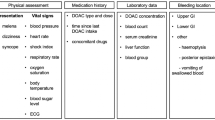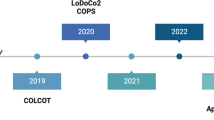Abstract
Clinicians struggle daily with the optimal regimen for patients with an indication for antiplatelet therapy after stenting and in patients needing oral anticoagulation treatment for atrial fibrillation (AF). This is not only difficult in patients with acute coronary syndrome (ACS) but also in the large number of patients with AF undergoing elective percutaneous coronary intervention (PCI). The challenge is to strike a balance between the increasing risk of bleeding events and ischemic or thrombotic events. Until recently, guidelines were based on expert consensus and a few small, many of them retrospective, trials. A so-called triple therapy with a vitamin K antagonist (VKA) and dual antiplatelet therapy (DAPT) with aspirin and clopidogrel was recommended for patients with AF undergoing PCI in stable coronary artery disease or for those with ACS. However, severe bleeding complications remain a major issue during triple therapy, particularly in the growing aging population. In the past year, randomized controlled trials (RCT) with direct-acting oral anticoagulants (DOACs) have modified the standard use of care, now favoring dual therapy with DOACs. This review elucidates the current influential RCTs on the new antiplatelet and anticoagulation strategies for patients with AF undergoing PCI or with ACS, and discusses whether triple therapy is still required.
Zusammenfassung
In der täglichen klinischen Praxis ist das optimale Regime für Patienten mit Indikation für eine Plättchenhemmung nach Stentimplantation und für eine dauerhafte orale Antikoagulation bei Vorhofflimmern nicht nur bei Patienten mit akutem Koronarsyndrom (ACS), sondern auch bei den vielen Patienten mit Vorhofflimmern und elektiver perkutaner Koronarintervention (PCI) immer noch umstritten. Die Abwägung zwischen schweren Blutungskomplikationen und ischämischen oder thromboembolischen Ereignissen stellt weiterhin die entscheidende Herausforderung dar. Bis vor Kurzem basierten die internationalen Leitlinien maßgeblich auf Expertenempfehlungen und wenigen kleinen, zumeist retrospektiven Studien, welche einer sog. Tripeltherapie mit einem Vitamin-K-Antagonisten und einer dualen Plättchenhemmung (bestehend aus Aspirin und Clopidogrel) den Vorzug für Patienten mit Vorhofflimmern und PCI bei stabiler koronarer Herzkrankheit (KHK) oder Patienten mit ACS gaben. Unter dieser Tripeltherapie kann es gehäuft zu schwerwiegenden Blutungskomplikationen, insbesondere in der stetig wachsenden älteren Patientenpopulation. Im letzten Jahr wurden randomisierte, kontrollierte, multizentrische Studien zu den direkten oralen Antikoagulanzien (DOAC) veröffentlicht, die einer dualen Therapie mit DOAC statt einer Tripeltherapie den Vorzug gaben und zur Modifikation der aktuellen Leitlinien führten. Im vorliegenden Übersichtsartikel stellen die Autoren die für die neuen Plättchenhemmungs- und Antikoagulationstherapiestrategien relevanten aktuellen Studien für Patienten mit Vorhofflimmern und PCI oder mit akutem Koronarsyndrom dar und diskutieren, ob eine Tripeltherapie noch indiziert ist.

Similar content being viewed by others
References
Schnabel RB, Yin X, Gona P et al (2015) 50 year trends in atrial fibrillation prevalence, incidence, risk factors, and mortality in the Framingham Heart Study: a cohort study. Lancet 386(9989):154–162. https://doi.org/10.1016/S0140-6736(14)61774-8
Sorensen NA, Shah AS, Ojeda FM et al (2016) High-sensitivity troponin and novel biomarkers for the early diagnosis of non-ST-segment elevation myocardial infarction in patients with atrial fibrillation. Eur Heart J Acute Cardiovasc Care 5(6):419–427. https://doi.org/10.1177/2048872615611108
Rubboli A, Colletta M, Valencia J et al (2009) Periprocedural management and in-hospital outcome of patients with indication for oral anticoagulation undergoing coronary artery stenting. J Interv Cardiol 22(4):390–397. https://doi.org/10.1111/j.1540-8183.2009.00468.x
Saczynski JS, McManus D, Zhou Z et al (2009) Trends in atrial fibrillation complicating acute myocardial infarction. Am J Cardiol 104(2):169–174. https://doi.org/10.1016/j.amjcard.2009.03.011
Lip GY, Windecker S, Huber K et al (2014) Management of antithrombotic therapy in atrial fibrillation patients presenting with acute coronary syndrome and/or undergoing percutaneous coronary or valve interventions: a joint consensus document of the European Society of Cardiology Working Group on Thrombosis, European Heart Rhythm Association (EHRA), European Association of Percutaneous Cardiovascular Interventions (EAPCI) and European Association of Acute Cardiac Care (ACCA) endorsed by the Heart Rhythm Society (HRS) and Asia-Pacific Heart Rhythm Society (APHRS). Eur Heart J 35(45):3155–3179. https://doi.org/10.1093/eurheartj/ehu298
Windecker S, Kolh P, Alfonso F et al (2014) 2014 ESC/EACTS Guidelines on myocardial revascularization: the Task Force on Myocardial Revascularization of the European Society of Cardiology (ESC) and the European Association for Cardio-Thoracic Surgery (EACTS)Developed with the special contribution of the European Association of Percutaneous Cardiovascular Interventions (EAPCI). Eur Heart J 35(37):2541–2619. https://doi.org/10.1093/eurheartj/ehu278
Valgimigli M, Patialiakas A, Thury A et al (2015) Zotarolimus-eluting versus bare-metal stents in uncertain drug-eluting stent candidates. J Am Coll Cardiol 65(8):805–815. https://doi.org/10.1016/j.jacc.2014.11.053
Kiviniemi T, Puurunen M, Schlitt A et al (2014) Bare-metal vs. drug-eluting stents in patients with atrial fibrillation undergoing percutaneous coronary intervention. Circ J 78(11):2674–2681
You JJ, Singer DE, Howard PA et al (2012) Antithrombotic therapy for atrial fibrillation: antithrombotic therapy and prevention of thrombosis, 9th ed: American College of Chest Physicians Evidence-Based Clinical Practice Guidelines. Chest 141(2 Suppl):e531S–575S. https://doi.org/10.1378/chest.11-2304
Kirchhof P, Benussi S, Kotecha D et al (2016) 2016 ESC Guidelines for the management of atrial fibrillation developed in collaboration with EACTS. Eur Heart J 37(38):2893–2962. https://doi.org/10.1093/eurheartj/ehw210
Dewilde WJ, Oirbans T, Verheugt FW et al (2013) Use of clopidogrel with or without aspirin in patients taking oral anticoagulant therapy and undergoing percutaneous coronary intervention: an open-label, randomised, controlled trial. Lancet 381(9872):1107–1115. https://doi.org/10.1016/S0140-6736(12)62177-1
Connolly SJ, Ezekowitz MD, Yusuf S et al (2009) Dabigatran versus warfarin in patients with atrial fibrillation. N Engl J Med 361(12):1139–1151. https://doi.org/10.1056/NEJMoa0905561
Patel MR, Mahaffey KW, Garg J et al (2011) Rivaroxaban versus warfarin in nonvalvular atrial fibrillation. N Engl J Med 365(10):883–891. https://doi.org/10.1056/NEJMoa1009638
Granger CB, Alexander JH, McMurray JJ et al (2011) Apixaban versus warfarin in patients with atrial fibrillation. N Engl J Med 365(11):981–992. https://doi.org/10.1056/NEJMoa1107039
Giugliano RP, Ruff CT, Braunwald E et al (2013) Edoxaban versus warfarin in patients with atrial fibrillation. N Engl J Med 369(22):2093–2104. https://doi.org/10.1056/NEJMoa1310907
Kernan WN, Ovbiagele B, Black HR et al (2014) Guidelines for the prevention of stroke in patients with stroke and transient ischemic attack: a guideline for healthcare professionals from the American Heart Association/American Stroke Association. Stroke 45(7):2160–2236. https://doi.org/10.1161/STR.0000000000000024
Mega JL, Braunwald E, Mohanavelu S et al (2009) Rivaroxaban versus placebo in patients with acute coronary syndromes (ATLAS ACS-TIMI 46): a randomised, double-blind, phase II trial. Lancet 374(9683):29–38. https://doi.org/10.1016/S0140-6736(09)60738-8
Gibson CM, Mehran R, Bode C et al (2015) An open-label, randomized, controlled, multicenter study exploring two treatment strategies of rivaroxaban and a dose-adjusted oral vitamin K antagonist treatment strategy in subjects with atrial fibrillation who undergo percutaneous coronary intervention (PIONEER AF-PCI). Am Heart J 169(4):472–478
Gibson CM, Mehran R, Bode C et al (2016) Prevention of bleeding in patients with atrial fibrillation undergoing PCI. N Engl J Med 375(25):2423–2434. https://doi.org/10.1056/NEJMoa1611594
Cannon CP, Bhatt DL, Oldgren J et al (2017) Dual antithrombotic therapy with dabigatran after PCI in atrial fibrillation. N Engl J Med. https://doi.org/10.1056/NEJMoa1708454
Author information
Authors and Affiliations
Corresponding author
Ethics declarations
Conflict of interest
N. Fluschnik, P.M. Becher, R. Schnabel, S. Blankenberg, and D. Westermann declare that they have no competing interests.
This article does not contain any studies with human participants or animals performed by any of the authors.
Rights and permissions
About this article
Cite this article
Fluschnik, N., Becher, P.M., Schnabel, R. et al. Anticoagulation strategies in patients with atrial fibrillation after PCI or with ACS. Herz 43, 20–25 (2018). https://doi.org/10.1007/s00059-017-4649-z
Published:
Issue Date:
DOI: https://doi.org/10.1007/s00059-017-4649-z




